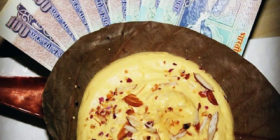India’s Robin Hood Army, a group of volunteers who head out in green t-shirts every Sunday to distribute food, clothes and blankets among the homeless across seven cities in the country, has chosen the day of the India-Pakistan World Cup match to spread its wings in the rival country.
“I keep reminding my Indian counterparts that even the Robin Hood Army is rooting for green! But on a serious note, it is just an exciting time for the Pak-India relationship and while we might be playing against each other on one platform, we stand together on another,” Sarah Afridi, who is spearheading the project in Karachi told Firstpost.
Post the match, Afridi, along with her family members will go out and distribute food to the homeless. While in India, the army has tied with various restaurants and eateries to distribute the leftovers or freshly cooked food among the homeless, in Karachi Afridi will only scout for tie-ups post a pilot distribution. So in essence, she will be funding the initial distribution herself.
In less than a year, the RHA has grown from a two-member organisation to a volunteer base of 400 that feeds around 2500-3000 homeless people on any given night and is actively present in Hyderabad, Bangalore, Jabalpur, Mumbai, Delhi, Kolkata and Jaipur. And after the Karachi chapter, RHA will start distribution in Lahore too by March.
“The RHA model can easily be replicated and decentralised. Like India, poverty and inequality is a problem in Pakistan too so why not replicate the model there too,” says 27-year-old Neel Ghose, the co-founder of the Robin Hood Army.
Afridi, Ghose’s counterpart in Karachi agrees. “As large swathes of Pakistan reel under the lack of basic necessities, we thought we could spread a little happiness with food. RHA works on a hyper-local model – to create self-sustained communities across the country. The demographics of Pakistan and India are very similar. Poverty is a widespread issue. According to the FAO, 40% of the children in Pakistan are malnourished and underweight due to lack of access to adequate food.
And this is not because there isn’t enough; Pakistan is the 8th largest food producing country, however, 50% of the population is food insecure. With the massive income inequality that persists, RHA is a brilliant movement,” she told Firstpost.
But what’s really unique about the model is not that it spread to several cities in such a short span, but the manner in which the movement became a nation-wide phenomenon— The entire operation is community driven with no funding whatsoever. People are mobilised either through word of mouth or through social media forums like Facebook and Twitter.
For instance, after every distribution, RHA updates its Facebook page with images and posts and invites volunteers to join the group and spread the love. During Christmas, RHA successfully started an initiative urging people outside the community to be Santa for the needy. Titled as Be Robin This Christmas, RHA asked people to go out and donate warm clothes, blankets and food to the homeless, click a picture/selfie and post it on the RHA Facebook page.
” We got a terrific response to the campaign. Even those who were not part of RHA were out on the streets distributing clothes and food, following which they would share their photos with us on Facebook. And even corporates like Zomato, Google and McKinsey did their bit. While Zomato bought blankets for the homeless in Delhi, Google and McKinsey set up collection boxes for volunteers.
However, Ghose cautions that corporate funding is out of the question for RHA as it believes it can scale without money.” Just by inspiring people to give back to society, we can be more sustainable. It’s all about community building and de-centralisation,” explains Ghose.
What’s clearly worked in favour of RHA is non-interference at the operational level. There is no strict guideline on how the processes should be carried out in each city but the best practices of every group is documented and shared with Robin Hoods.






Leave a reply